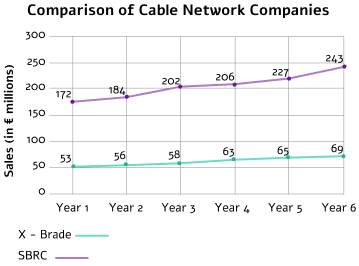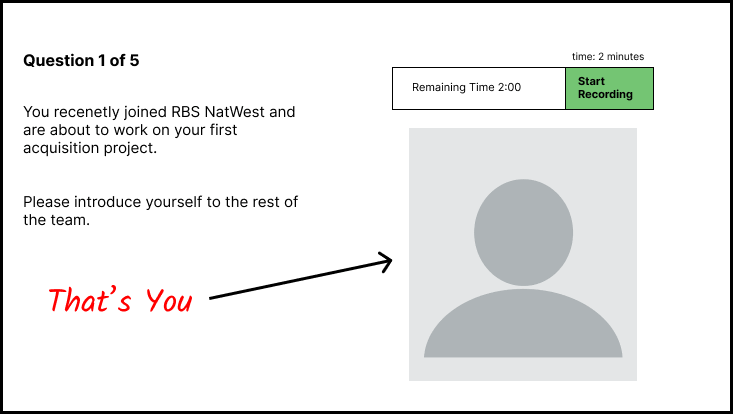 RBS NatWest Assessment Test – The Complete Preparation Guide [2025]
RBS NatWest Assessment Test – The Complete Preparation Guide [2025]
RBS (The Royal Bank of Scotland) is one of the largest commercial banks in Scotland. In 2020, RBS changed its entity and name, and began operating as NatWest Group. Since then, the names RBS and NatWest have been interchangeable.
As one of the Big Four clearing banks in the UK, with more than 960 branches across Great Britain, RBS NatWest offers a wide variety of positions, graduate programmes, internships, and apprenticeships. With a large number of applicants and only a limited number of open positions, the competition is very high.
As a result, RBS NatWest conducts a selective recruiting process with several stages, including a pre-recorded interview and various online assessment tests, each with its own unique challenges. But with extensive practice, you can improve your chances of being selected for your desired role.
On this page, you will find everything you need to know about the RBS NatWest assessment, including test types, sample questions, and solving tips.
This page is about the SHL Assessment Tests employed by RBS.
Are you taking the Talent-Q assessment for RBS? Check out our dedicated page on Talent-Q Preparation.
What Is the RBS NatWest Assessment Test?
The RBS NatWest Assessments, provided by SHL, is a series of three tests, each aims to evaluate a different skill or ability required for the position you applied for and to fit in with the RBS NatWest organisational culture.
- Work scenarios assessment – a Situational Judgement Test that assesses your work-related behaviour, preferences, and tendencies.
💡 Learn more about SHL’s Situational Judgement Test - Reasoning skills assessment – an ability evaluation that assesses your cognitive abilities through your numerical and logical reasoning competencies.
💡 Learn more about SHL’s numerical and logical reasoning tests - Pre-recorded interview – a one-way video interview that assesses your professional experience, traits, motivations, and capabilities.
💡 Learn more about pre-recorded interviews
For some positions, you will also be summoned to the RBS NatWest assessment centre to examine your practical skills and abilities through various exercises.
🔍Taking Multiple Finance Tests?
HSBC | UBS | Bain & Co | Macquarie | Morgan Stanley | EIB | Deloitte | Deutsche Bank | Barclays | KPMG | PWC | Lazard | EY | Nomura | BCG | BNP Paribas | Jefferies | Moelis & Co | Job Simulation | Pre-recorded Video Interview | HireVue Interview
Bundles: Summer Internship | Spring Week | Big 4
RBS NatWest Work Scenarios Assessment
The RBS NatWest Work Scenarios assessment is a Situational Judgement Test (SJT) that assesses your working style, work-related behaviours, and how you fit into the RBS NatWest working environment and culture.
You will be presented with a workplace scenario followed by a number of possible responses.
You will need to rate the effectiveness of each response on a scale of 1-5, from highly undesirable to highly desirable.
Let’s see how it looks –
Your manager is assigning your team a new innovative project which he believes could increase revenue tremendously. He is very excited about it and seems to expect that you will feel the same, leading the team that will work on the project. However, when he describes the project’s details, you begin to have doubts. The costs seem high, and you are not sure customers will show as much interest in the product as your manager expects them to.
Rank the following reactions from worst to best:
Go along with the project. Your manager has more information than you do and probably thought everything through. There’s no reason to dismiss a project he believes in so much before it even begins.
Show appreciation for his choice to assign the project to your team, but mention that you have some additional thoughts on the matter and speak your concerns.
Say you’re worried that not everything will work out as expected, and point out the troubling elements.
Take the project and thank your manager. Later, make adjustments to his plan that you think may help.
This question assesses your response to a disagreement with a figure of authority.
Taking up the project and making changes on your own to it (response D) is a response which shows initiative and independence. However, doing so without consulting or at least informing your manager lacks integrity. This is crucial, and therefore this response is ranked 1 (lowest).
Going along with the project without saying anything (response A) is less problematic, as you are not making unauthorized changes. However, your input is valuable and your concerns should be heard. Providing your opinion is generally essential, especially when there are existing concerns about large-scale projects. Thus, this response is ranked 2.
Response C once again shows independence. You have something important to say and you say it, without undermining authority. This is a good response, which has been ranked 3.
The best response, which was ranked 4, is response B. Here, you voice your concerns but also show appreciation for the opportunity your manager is giving you. Providing your input and maintaining relationships are important elements of working under management.
TIP: The catch with these questions is that some responses may look alike or similarly desirable. Thus, carefully read each response, consider the position you are applying for and the company’s values, and pick your ranking accordingly.
Check out JobTestPrep’s realistic SHL PrePack, with SHL style SJT, numerical reasoning, and logical reasoning practice tests.

RBS NatWest Reasoning Skills Assessment
The RBS NatWest Reasoning Skills assessment comprises two tests – numerical reasoning and logical reasoning. Both evaluate your cognitive abilities, including interpreting and processing information and your problem-solving approach.
RBS NatWest Numerical Reasoning Test
The numerical reasoning test assesses your ability to understand, calculate, and interpret numerical data.
You will be presented with graphs, charts, or tables containing numerical information, followed by multiple-choice questions. You will need to analyze the data to reach the correct answer.
This is how it looks –
Numerical Sample Question:

What percentage of the revenue in years 2 and 3 is X-Brade responsible for?
TIP: These questions often include unnecessary data while the actually relevant information lies in the minutiae. Thus, you should pay attention to the titles and headings, which can contain crucial details such as units and percentages.
RBS NatWest Logical Reasoning Test
The logical reasoning test assesses your ability to recognize patterns and sequences and draw logical conclusions.
You will be presented with a set of abstract figures that follows a certain pattern. You will need to identify the pattern and determine the next figure in the series.
Let’s take a look –
Logical Reasoning Sample Question:

Choose the image that completes the pattern
TIP: The rule you are looking for can lie in the direction, shape, or change in size. Form an assumption of what that rule can be and apply it to the whole sequence. If it fits, you got it. If it doesn’t, form another rule.
RBS NatWest Pre-recorded Interview
The pre-recorded interview is a one-sided interview that assesses your professional experience, personality traits, competencies, and motivations.
In this type of interview, you will not interact with your interviewer; instead, you will be given questions and will need to record your answers in front of a camera via the SHL video platform.
Though it doesn’t replace the traditional personal interview, you will receive similar open-ended questions regarding your former and present working place, goals for the future, interests in working at RBS NatWest, and so on. These can be questions like –
- Tell us about yourself
- Why do you want to work at RBS NatWest?
- What's one time you successfully did something in a team?
- Tell me about a time you were under pressure
You will have 2 minutes to prepare your answer and up to 3 minutes to record it.

TIP: Though it might feel impersonal, you need to treat it like a regular face-to-face interview, as it is your first impression on your recruiters. Dress properly, find a quiet place without any distractions, look straight at the camera, be friendly, and don’t forget to smile.
Check out JobTestPrep’s realistic SHL PrePack, with SHL style SJT, numerical reasoning, and logical reasoning practice tests.

RBS NatWest Assessment Centre
For some positions, the final stage of the recruiting process is to attend the RBS NatWest assessment centre, where you will be required to perform a series of tasks that further assess your compatibility with the job and the organisation’s culture.
The types of tasks vary from one position to another and usually include –
- Group Discussions – alongside other applicants, you will showcase how you work together and cooperate to overcome difficulties and find solutions, as you will on the job.
- Interview – a face-to-face interview with your hiring manager, in which you will be asked about your past experience, career plans, and motivations. This is your opportunity to show that you are the perfect match for the job.
- Case Study – you will receive business-related scenarios via email. You will have a time limit to respond to those scenarios as though you were already on the job.
- Presentation – this task is relevant only to those who apply for the Graduate Programme. You will be given a brief of a potential business plan, and you will need to research the case and present your findings to your recruiters.




